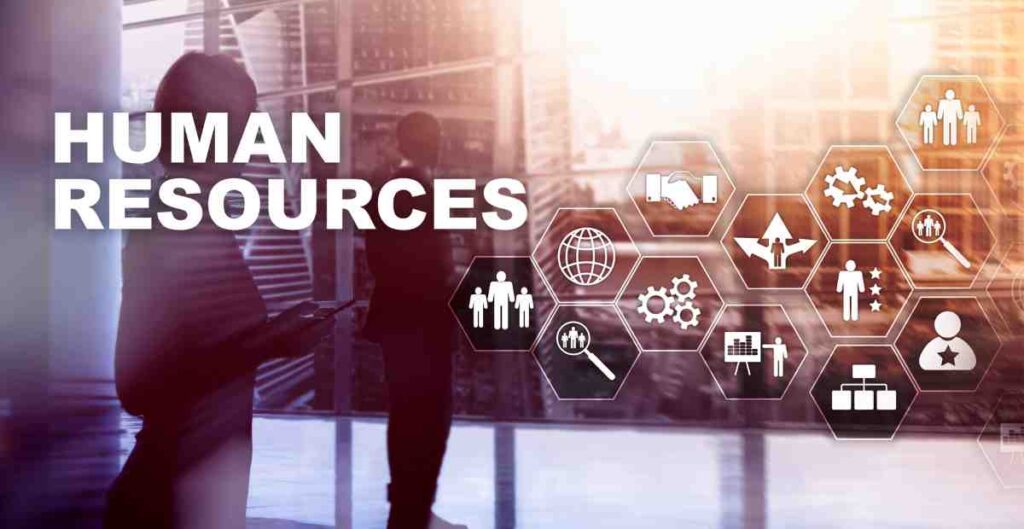The importance of Human Resource Management (HRM) cannot be overstated in any organization’s success story. Hence it is crucial even now when we are experiencing an era of advanced digital technology which magnifies HR’s role further exponentially; with newer paradigms such as digital HR or HR digitization emerging every day creating significant impact on workplace practices by enhancing productivity levels while keeping employee satisfaction levels high at the same time!This shift towards this revolutionary approach enables companies to ensure streamlined processes with higher efficiency resulting in optimized workflow throughout their staff leading to better output overall!
Understanding HR Digitization
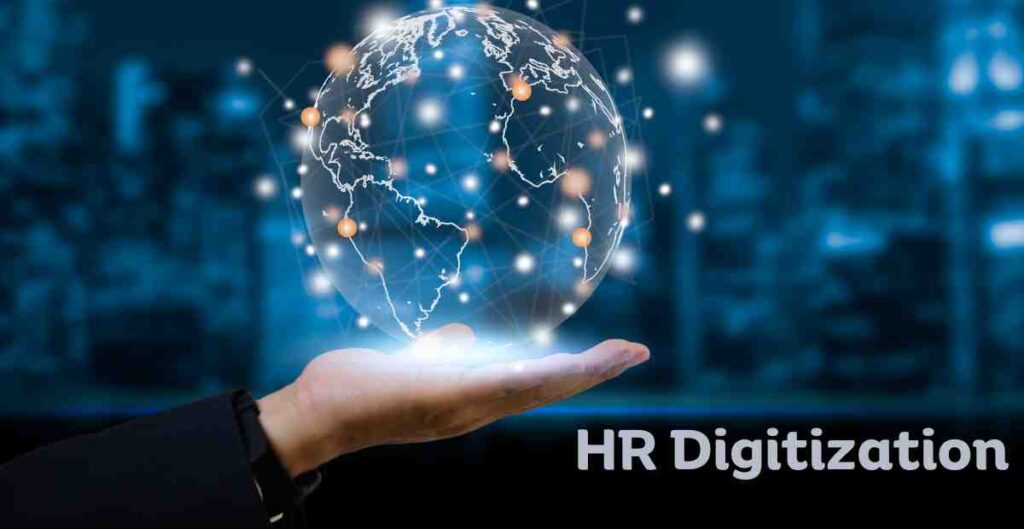
The use of digital technologies to enhance traditional human resource functions is widely known as Digital Human Resource Management (HRM). From benefiting administration to scheduling training programs – it encircles all aspects within the HR realm at a company hence improving their workflow efficiency. Automating routine assignments like payroll duties saves time otherwise spent on tedious manual tasks which can be re-routed to more value-adding endeavors.
Recognizably so; it’s not just about riding on the latest tech trends alone but adapting as aligning with employees and customer demands by keeping up with rising technological advancements especially perpetuated by our current data-driven society today.Digital
HR practices prompt innovative shifts beyond day-to-day transactions aimed at creating solutions backed by cutting-edge technology enabling creativity spawn at the intersection industry sectors strategy overviews increasing overall effectivity Ensuring digitization familiarizes standard operating procedures with speedier delivery timesystems fostering transparent communication within teams creating seamless planning for businesses in complex market environments building better employee experiences leading to improved retention levels.
The Impact of HR Digitization
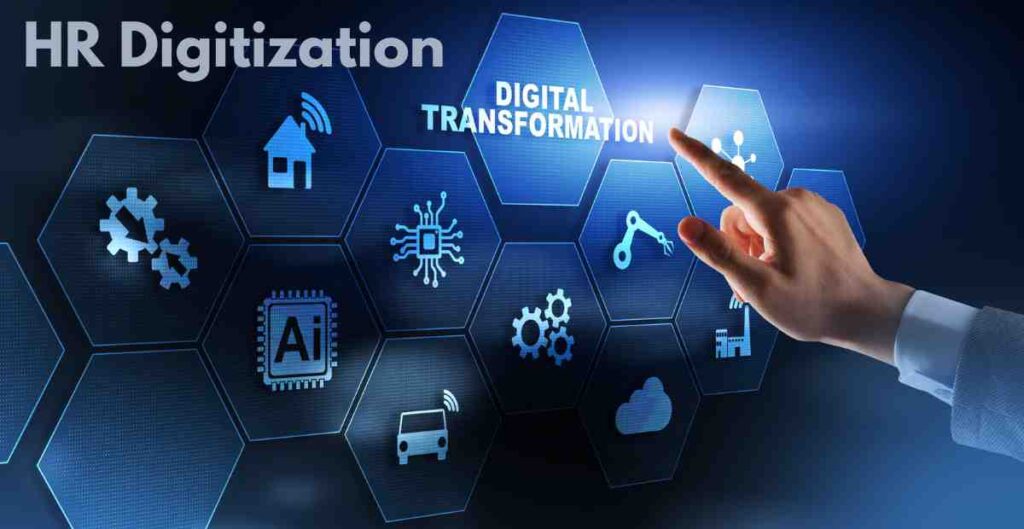
HR digitization provides many advantages that span widely across an organization’s different areas of operation. When it comes to employees, going digital with your human resource practices means enabling a smoother experience for them by allowing them easier access to HR services without constraints regarding time or place whatsoever using technology devices they prefer greatly saving them precious time hence contributing to own personal development as well as helping balance personal life versus work life more efficiently than ever before! On the employer end of things; utilizing digital HR tools enables better decision-making based on valuable data insights generated from tracking various useful metrics such as engagement rates among others which leads organizations towards smarter strategic thinking–ultimately strengthening future competitiveness for lasting success.
Inclusivity & Diversity within the workplace is also further fostered through using digital methodologies; Hiring processes become fairer by leveraging diversity-enhancing recruitment pipelines free from limiting physical barriers allowing you access to global talent pools— In addition; remote working arrangements supported by HR digitization enable companies to be more accommodating of individual employees’ needs, making them increasingly attractive to a diverse workforce that values work-life balance
However, while the benefits are clear, implementing digital HR is not without its challenges. Companies must navigate issues such as data privacy and security, employee resistance to change, and the need for ongoing training and support. But with careful planning and execution, these challenges can be overcome, leading to a more efficient and engaging workplace.
The Essential Tools for HR Digitization
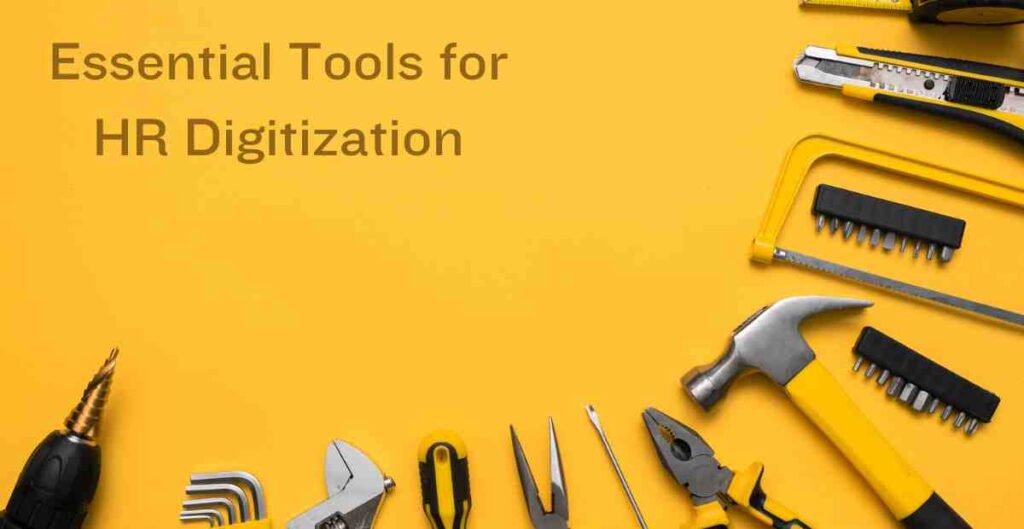
As you embark on your journey towards HR digitization, there are several tools that can help streamline the process.
- HR Management Systems (HRMS): Modernizing your workforce isn’t just about upgrading technology or adopting new software; its about enhancing institutional processes to build a thriving ecosystem. Integrating the Human Resources Management System (HRMS) is one way to do so! You get access to a centralized platform that manages every task associated with HR functioning- right from recruiting fresh talent to employee onboarding through benefits administration! By eliminating multiple systems this serves as an ingenious model of digital transformation in human resource practices!
- Recruitment Software: This advanced digital HR tool offers businesses an efficient solution for managing their recruitment needs. With automated processes for job postings, applicant tracking, and interview scheduling employers can confidently broaden their search for top talent while ensuring that every candidate is evaluated fairly and objectively.
- Performance Management Software: This remarkable instrument aids in the supervision and monitoring of employee work performance. It empowers businesses to establish and oversee targets, deliver constructive criticism, as well as administrate assessments of achievement consistently and impartially. This valuable tool is an essential component of present-day computerized HR methodologies that can drastically improve worker motivation and efficiency.
- Learning Management System (LMS): In today’s business world, digital training solutions have become a requisite element of company operations. Adopting a Learning Management System (LMS) is a highly effective method of delivering continuous employee growth opportunities that optimize staff capability while enhancing their job satisfaction. Talent retention becomes easy when employers prioritize such measures.
- Employee Engagement Platforms: Organizations are embracing digital HR tools as a critical element in fostering efficient communication, active collaboration amongst colleagues as well as encouraging recognition programs. As employees effectively utilize these platforms it culminates to a more receptive working culture translating to amplified levels of satisfaction & engagement.
- HR Analytics Tools: Businesses can use specialized technological tools to gather, assess, and present HR data for analytical purposes. This approach leads to the discovery of important patterns regarding staffing employees’ sustenance in the company their work performance and other such vital HR metrics. Consequently companies can utilize these discoveries to make well informed and tactical HR decisions.
- Digital HR Document Management: A reputable way to store and manage company HR documents is via digital format. Opting for this system allows businesses to cut down on paper usage while providing seamless access and retrieval of files as required.
Implementing HR Digitization
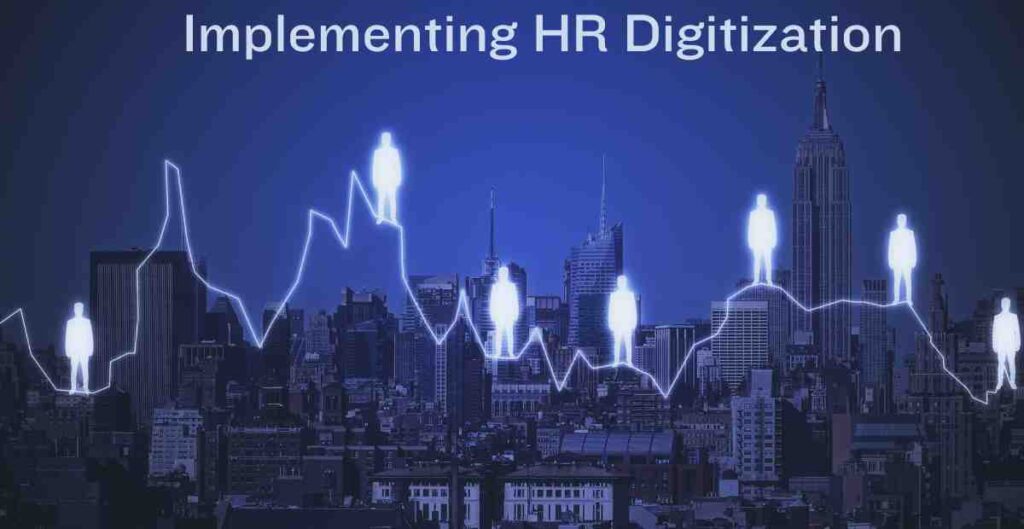
Implementing HR digitization is not a one-time event but a journey. It requires careful planning, execution, and ongoing support. Here are some steps to ensure a successful implementation:
- Assess Your Current HR Processes: Identify the strengths and weaknesses of your current HR processes. This will help you determine which areas need improvement and which digital HR tools can best address these needs.
- Choose the Right HR Tools: Not all digital HR tools are created equal. Choose those that align with your business goals, budget, and HR needs. Look for tools that are user-friendly, flexible, and scalable.
- Train Your Staff: Implementing new digital HR tools requires training your staff to use them effectively. Provide ongoing training and support to ensure a smooth transition.
- Monitor and Adjust: Once you’ve implemented your digital HR tools, monitor their performance and impact. Gather feedback from your employees and make necessary adjustments to ensure they are meeting your HR goals.
Conclusion
HR digitization is no longer a luxury but a necessity in today’s digital age. By leveraging digital HR tools, companies can enhance their HR processes, making them more efficient, accurate, and employee-centric. While the journey towards HR digitization may be challenging, the benefits far outweigh the costs. It’s a journey worth taking for any company that wants to stay competitive and successful in the digital era.
Frequently Asked Questions
How is Digital HR transforming Human Resources?
Digital HR is radically transforming Human Resources by introducing technological solutions to traditional HR problems. Firstly, it improves efficiency by automating routine tasks such as payroll, benefits administration, and time tracking, freeing up HR professionals to focus on strategic initiatives. Secondly, digital HR facilitates better data collection and analysis, enabling more informed decision-making and predictive analytics. It’s also enhancing the employee experience through the creation of digital platforms that mirror the convenience and intuitiveness of popular consumer apps. Finally, digital HR solutions enable remote and flexible work arrangements, which have become increasingly important in the modern workforce.
Why is HR digitalization important?
HR digitalization is crucial for several reasons. It increases efficiency by automating repetitive tasks, thereby freeing HR professionals to focus on strategic issues. It improves accuracy by reducing the risk of human error in data entry and calculations. Furthermore, digital tools provide rich data for analysis, facilitating more informed decision-making and predictive analytics. HR digitalization also enhances the employee experience by providing convenient, easy-to-use platforms for various HR functions. It allows for remote and flexible work arrangements, which are increasingly important to employees today. Finally, digitalization can help address significant challenges such as talent shortages, as it allows for broader sourcing strategies and advanced talent analytics.
What is the difference between digitization and digitalization in HR?
Digitization and digitalization, while often used interchangeably, have distinct meanings in the context of HR. Digitization refers to the process of converting analog information into digital formats. For example, digitizing paper records into a computer database. On the other hand, digitalization is the use of digital technologies to change a business model and provide new revenue and value-producing opportunities. In the HR context, digitalization could involve leveraging data analytics for talent acquisition, utilizing AI for recruitment processes, or creating digital platforms that enhance the employee experience. Therefore, while digitization is about transforming data, digitalization is about transforming the way HR operates.
What are the 4 phases of digital HR?
The four phases of digital HR typically include: digitization, integration, transformation, and innovation.
- Digitization involves converting analog or manual HR processes into digital formats, like moving from paper-based records to digital databases.
- Integration entails aligning these digitized processes with the organization’s overall digital infrastructure, ensuring that all systems work together seamlessly.
- Transformation is about leveraging the digitized and integrated HR systems to bring about meaningful change in HR operations, such as using data analytics to inform decision-making or using AI to automate repetitive tasks.
- Innovation is the final phase where HR seeks to continuously evolve and adopt new digital technologies that can further enhance HR functions and contribute to the organization’s strategic goals.
Each phase progressively builds on the previous one, leading to a comprehensive digital HR strategy that optimizes efficiency, enhances decision-making, and improves the overall employee experience.
What is the objective of HR digital transformation?
The main objective of HR digital transformation is to leverage technology to improve efficiency, enhance decision-making, and improve the overall employee experience. Through automation of routine tasks, HR professionals are freed to focus on strategic initiatives. Advanced data analytics enabled by digital transformation can provide insights for more informed decision-making, predictive analytics, and talent management strategies. Additionally, digital transformation aims to enhance the employee experience through intuitive digital platforms, enabling flexible work arrangements and personalizing the HR experience. In the larger context, HR digital transformation seeks to align HR operations with the broader digital strategy of the organization, ensuring that HR contributes to achieving the organization’s strategic objectives.
How to start an HR digitization project?
An HR digitization project should start with a clear vision, strategy, and roadmap that define the goals, priorities, scope, and timeline of the project. HR digitization project should also involve collaboration between the HR department and the IT department, as well as other stakeholders such as senior management, employees, and external partners1. An HR digitization project should also follow a structured approach that includes the following steps:
- Identification of the current state and gaps of the HR processes and systems
- Selection of the best-fit digital solutions and vendors that meet the requirements and budget
- Implementation of the digital solutions with proper testing, training, and change management
- Evaluation of the outcomes and benefits of the digital solutions and continuous improvement.

